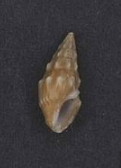Biology:Clavus obliquatus
From HandWiki
Short description: Species of gastropod
| Clavus obliquatus | |
|---|---|

| |
| Apertural view of a shell of Clavus obliquatus (museum specimen at Naturalis Biodiversity Center) | |
| Scientific classification | |
| Domain: | Eukaryota |
| Kingdom: | Animalia |
| Phylum: | Mollusca |
| Class: | Gastropoda |
| Subclass: | Caenogastropoda |
| Order: | Neogastropoda |
| Superfamily: | Conoidea |
| Family: | Drilliidae |
| Genus: | Clavus |
| Species: | C. obliquatus
|
| Binomial name | |
| Clavus obliquatus (Reeve, 1845)
| |
| Synonyms[1] | |
| |
Clavus obliquatus is a species of sea snail, a marine gastropod mollusk in the family Drilliidae.[1]
Description
The length of the shell attains 33 mm.
The shell is yellowish brown, within and without, with a narrow lighter band on the periphery, and sometimes a row of white dots on the ribs a little below the middle of the body whorl. There are a few revolving striae at the base of the shell.[2]
Distribution
This marine species is endemic to Australia and occurs off Queensland; it has also been found off the Philippines .
References
- ↑ 1.0 1.1 Bouchet, P. (2015). Clavus obliquatus (Reeve, 1845). In: MolluscaBase (2015). Accessed through: World Register of Marine Species at http://www.marinespecies.org/aphia.php?p=taxdetails&id=597135 on 2016-08-15
- ↑ G.W. Tryon (1884) Manual of Conchology, structural and systematic, with illustrations of the species, vol. VI; Philadelphia, Academy of Natural Sciences (described as Drillia obliquata)
- Reeve, L.A. 1845. Monograph of the genus Pleurotoma. pls 20–33 in Reeve, L.A. (ed). Conchologia Iconica. London : L. Reeve & Co. Vol. 1.
- Wells F.E. (1991) A revision of the Recent Australian species of the turrid genera Clavus, Plagiostropha, and Tylotiella (Mollusca: Gastropoda). Journal of the Malacological Society of Australia 12: 1–33.
- Wilson, B. 1994. Australian Marine Shells. Prosobranch Gastropods. Kallaroo, WA : Odyssey Publishing Vol. 2 370 pp.
Wikidata ☰ Q7860329 entry
 |

